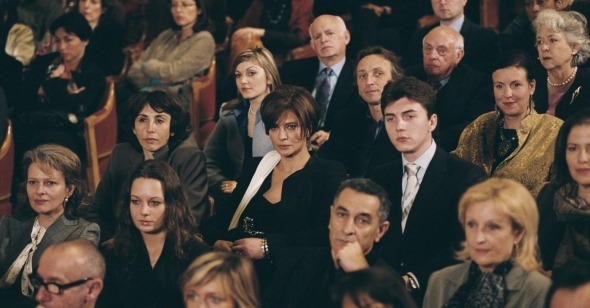A Wink and a Smile
By Nick Pinkerton
Avenue Montaigne
Dir. Danièle Thompso, France, THINKFilm
I doubt that anyone will ever match the balanced stridency and sentimentality that Jonathan Richman’s song “Give Paris One More Chance” manages as a bursting, corny catalog of everything right about “the home of Piaf and Chevalier,” but Avenue Montaigne takes a crack. The film's helmed by Danièle Thompson, a relative latecomer to direction but a professional screenwriter since 1966, with a resume that covers all of subsequent popular French cinema. I mean popular, not acclaimed: she had a hand in the eighties teen romp La Boum, the generational impact of which in France was at the seismic level of John Hughes—if you think, based on the art-house stuff that makes it stateside, that the average French moviegoer is a creature of immaculate, elevated taste, think again. Having worked at a video store, I can testify that La Boum still out-rents Claire Denis films by a 1000:1 margin among Francophones.
Gamine Jessica (Cécile de France) hits Paris fresh from Burgundy, where she's been looking in on her grandmother (Suzanne Flon). Once arrived, she finds work at the Café des Arts, a brasserie which draws a brisk business from show folk at the adjacent Théâtre des Champs-Élysées (that the Café is a last anachronistic holdover in a neighborhood given over to expensive boutiques deeper establishes the movie's keen nostalgia). Going about her duties, our girl finds herself brushing up against a host of artists and aesthetes, all of them poised at important life junctions: Jean-Francois (Albert Dupontel), a concert pianist whose aversion to the ceremonial strictures of the tour circuit has reached breaking point, and his despairing manager/ wife (Laura Morante); Jacques (Claude Brasseur), an aging and secretly stricken art collector preparing to set his life's work on the auction block, at odds with his professor son (Christopher Thompson, the director’s son, who co-wrote the script); Catherine (Valérie Lemercier), an already spread-thin TV actress getting ready to open a Feydeau production and feverishly selling herself to play Simone de Beauvoir for a high-profile American director (Sydney Pollack), this when not stealing naps with a close-to-retirement concierge (chanteuse-actress Dani) steeped in decades of backstage lore.
Thompson keeps her cast crisscrossing as three concurrent big nights approach: Jean-Francois's concert, Jacques's auction, and Catherine's opening night. If everything doesn't get nicely bundled up by the time the credits descend, at least everyone seems marginally happier. The movie—relentlessly namedropping, soundtrack laced with Aznavour, Gilbert Bécaud—invests heavily in the idea of eternal Parisian glamour and creative fecundity; an early sense of continuum is established between Jessica and her grandmother, who predicts Jessica's adventure by incessant talk of her own younger days, spent basking in the cosmopolitan aura. Some poignancy comes with the presence of Flon, a six-decade stage and screen veteran, who died shortly after shooting; the film is dedicated to her, and though her role is small, her potent hardscrabble backstory and inherent air of history suffuses the film. She gets the movie’s last lines, a shamelessly sentimental coda that must be accepted as a curtain call.
Avenue Montaigne was chosen as France's representative for the 2006 Oscars, which seems proper; it’s nobody's idea of a masterpiece, but it shows off Paris in a faintly enchanted light that could make Parisians proud, and make others want to visit. The craftsmanship is unexceptional, with the use of Scope particularly inexplicable, and the film’s finally more pleasant than funny—you could call it fluff and you'd be right. But it stays within its own modest boundaries, so why get peevish? Thompson's relaxed, tender way with actors helps: Cécile de France knows that all she has to do is smile, and she does her part dazzlingly.
